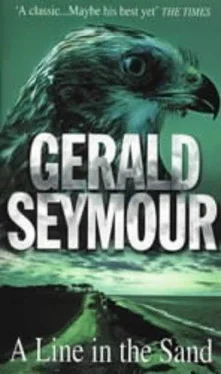Gerald Seymour - A Line in the Sand
Здесь есть возможность читать онлайн «Gerald Seymour - A Line in the Sand» весь текст электронной книги совершенно бесплатно (целиком полную версию без сокращений). В некоторых случаях можно слушать аудио, скачать через торрент в формате fb2 и присутствует краткое содержание. Жанр: Триллер, на английском языке. Описание произведения, (предисловие) а так же отзывы посетителей доступны на портале библиотеки ЛибКат.
- Название:A Line in the Sand
- Автор:
- Жанр:
- Год:неизвестен
- ISBN:нет данных
- Рейтинг книги:3 / 5. Голосов: 1
-
Избранное:Добавить в избранное
- Отзывы:
-
Ваша оценка:
- 60
- 1
- 2
- 3
- 4
- 5
A Line in the Sand: краткое содержание, описание и аннотация
Предлагаем к чтению аннотацию, описание, краткое содержание или предисловие (зависит от того, что написал сам автор книги «A Line in the Sand»). Если вы не нашли необходимую информацию о книге — напишите в комментариях, мы постараемся отыскать её.
A Line in the Sand — читать онлайн бесплатно полную книгу (весь текст) целиком
Ниже представлен текст книги, разбитый по страницам. Система сохранения места последней прочитанной страницы, позволяет с удобством читать онлайн бесплатно книгу «A Line in the Sand», без необходимости каждый раз заново искать на чём Вы остановились. Поставьте закладку, и сможете в любой момент перейти на страницу, на которой закончили чтение.
Интервал:
Закладка:
The bus sped down the narrow road beyond the docks and left the city behind. He was lighting a cigarette, the flame close to his nostrils, when the driver stamped on the brake. He saw the man peering ahead. Through the cigarette smoke and the windscreen, a red light waved in the night's darkness. The bus slowed as the driver pumped the brake. He leaned forward, to make out a shadowed figure behind the light, and then a road-works emergency sign. He disliked lateness and glanced at his watch. He saw, thought he saw, a figure pass beside the bus carrying something, but could not be certain. The barrier was pulled aside and the bus powered on past the man holding the light. He eased back into his seat. Above the cackle of accents and laughter, the director heard the single thud from the side of the bus behind him and twisted instinctively towards the source of the noise. The last thing that registered clearly in his mind was the sight of the wall of fire coming like a torrent in spate through the bus. In the final moments of his life, the fire surged against his clothes, the skin of his hands and face, and beating in his ears were the screams of the scientists and foreign engineers. Trapped in the bus, with the flames and the screams, there was no possibility of escape.
"The personnel burned to death. Christ."
"We delayed the programme.~ "But the missile factories were the same the morning after."
"Not the same. Yes, bits of metal remained in underground workshops, but the team was gone. Take the team away and you screw the projects. Men matter. It's simply not possible to fly in replacements and carry on as if nothing had happened."
"The missile programme was the greater evil?"
"In three years they would have had the capability of striking against any country in the Middle East, including Israel even the possibility of reaching southern Europe. We bought five years.
"What was the lesser evil?"
For three consecutive days the satellite photography showed the skeletal shape of the burned-out bus. On the first day the movement of rescue workers retrieving bodies could be clearly seen from the enhanced pictures, with fire engines and ambulances. Radio Tehran carried reports of a tragic road accident in which twenty-four men involved in the petrochemical industry had died. The next day the photography showed a small group of forensic experts, identified by their white overalls, crawling through the gutted bus, and Radio Tehran made no mention of the accident. On the third day the pictures beamed from the satellite showed the bus being loaded on to a flat-top lorry, and Radio Tehran's bulletins had brief reports of local funerals. By that third day, the United States Navy fast patrol boat had returned to normal duties, and the United States Air Force had flown five agents of the Mossad to Israel and the life of Gavin Hughes had been painted out.
"Twenty-four men killed did I hear right, Mr. Littelbaum? Is that what you're telling me? I can barely believe what you're saying."
"What you heard a programme was delayed."
"That was the greater evil?"
"Their Weapons of Mass Destruction threatened our interests."
"And what the hell was the lesser evil?"
"The involvement of Juliet Seven Gavin Hughes. The mission was done skilfully, and they'd a poor forensic infrastructure. It was days, going on two weeks, before they could confirm the initial suspicion of sabotage, and by then Gavin Hughes had ceased to exist."
"I'm damn near speechless, it was pure savagery."
"We were looking after our backs, and we did it well."
"You were involved?"
"To a small degree, liaison yes, I was involved."
"Did you consider the human misery the widows, the children?"
"We considered the effect of the missile programme. I don't really find emotion helps me get through the day."
"What about the little, awkward matter of state-sponsored terrorism?"
"Not applicable."
"If the Iranians kill one of their Kurds in Berlin, wherever, or a man anywhere in Europe who's planning murder, mayhem, in Tehran, we shout, scream, recall ambassadors, impose trade sanctions. We call it state-sponsored terrorism."
"Correct."
"If we roast twenty-four Iranians-' "We call it looking after our backs."
"Forgive me, but that is mind-bending hypocrisy."
"You are driving too fast again, Mr. Markham."
"And if the Israelis go into Jordan to murder an activist?"
"That is justifiable self-defence. You should slow down a bit, Mr. Markham. I would suggest to you that the prime objective of an intelligence agent is to further by clandestine means the objectives of the tax-payers who put food in his gut and a roof over his head."
"I believe in morality."
"I don't get to mix with people who use that word often… That's a better speed, thank you."
"I hope you sleep well at night."
"I sleep excellently, thank you. If we all talked about morality, Mr. Markham, we'd none of us finish a day's work."
"You used that poor bloody sales engineer."
"What the lady, Miss Parker, said, your work took you to Ireland. Unless you were completely useless at your job, I would have to assume that you "used" people, were competent at running agents, manipulating them, exploiting them. Then you let them go… They did a job of work for you… Did you go and see your line manager and bleat about your unhappiness at the ethics of running informers?"
"When does the marksman shoot, Mr. Littelbaum?"
"I beg your pardon?"
"Does the marksman shoot as the predator approaches the tethered goat or when it's on the goat?"
"He shoots when he has the optimum chance of a clean kill. It's nice country out here. It's a little bit like west Iowa country."
"Thank you."
"For what?"
"For telling me."
"Do you feel the better for it?"
"I'm devastated… but yes, I'm the better for knowing it."
"Would your Juliet Seven be the better for knowing it? Will you tell him?"
"I don't know I feel like throwing up. He was betrayed, treated like shit."
"I think we're going to hit the rain, which is a shame… Listen, Mr. Markham, we went to a hell of a lot of trouble to do your Juliet Seven a favour. The Israelis could have machine-gunned the bus and left their calling-card, bullets and grenades. We insisted on the fire and gave the Mossad the hardware, which guaranteed slow, difficult progress for the Iranian investigators. We bought your man time for his disappearance. He should have been safe, beyond their reach I imagine, if you ever have the chance to look for it, it was his error that led them here. We did enough for him. Do you think there's time to stop for a pork pie and a beer?"
The beach seemed endless, stretching to the horizon where the cloud was poised over the grey stones of the wall behind which was the marshland. The wind and rain beat relentlessly on their backs.
Not until they turned for home did his principal start to talk. Davies stayed a pace behind him.
"Look at this place. It's as good as dead, it's condemned. Everything here is for nothing. The sea rules and eats at the place, like it's rotten and decayed. Seven hundred years ago this place was alive. It had a great fleet for trade, fishing and boat-building.
The Saxons, the Vikings and the Normans settled here, where we are now. It had wealth. Their boats sailed after fish as far north as Iceland and they traded as far south as Spain and east to the Baltic. The sea killed this place, that same sea. In January 1328, there was a storm and a million tons of sand and stone was washed across the river mouth. The wealth went and the land began to follow it. The sea has the ultimate power. It eats at the cliffs and at the beach every minute of every day. Right here, where we are, it's a yard a year. Up the coast, not far, it's four hundred yards in the last five years. The fucking place, and everyone who's here, they're all doomed. Little people, fucking pygmies, living their lives, thinking they can change things. They've bulldozed sea walls, concreted the base of the cliffs, put in groynes and breakwaters, but it doesn't make a damn of difference. The sea keeps on coming. A couple of miles down the coast was the tenth biggest town in England, five churches, built by people who thought that they'd last for ever. Now they're all gone into the sea. They were pygmies then and pygmies now. The sea cannot be resisted. We're all dead here, doomed, we have no future. We build little houses, little gardens, make our little lives and for what? For flicking nothing. People paid masons to carve gravestones so that the lives of their fathers, mothers, brothers, sisters would be remembered but the stones are under the sea, like they'd never existed. We worry about the present but we're just too small. The future is the sea coming in, taking, snatching, in spite of our little efforts to protect ourselves. There is nothing we can do because there is no defence… Will you tell me, when do you think the bastard will come?"
Читать дальшеИнтервал:
Закладка:
Похожие книги на «A Line in the Sand»
Представляем Вашему вниманию похожие книги на «A Line in the Sand» списком для выбора. Мы отобрали схожую по названию и смыслу литературу в надежде предоставить читателям больше вариантов отыскать новые, интересные, ещё непрочитанные произведения.
Обсуждение, отзывы о книге «A Line in the Sand» и просто собственные мнения читателей. Оставьте ваши комментарии, напишите, что Вы думаете о произведении, его смысле или главных героях. Укажите что конкретно понравилось, а что нет, и почему Вы так считаете.












